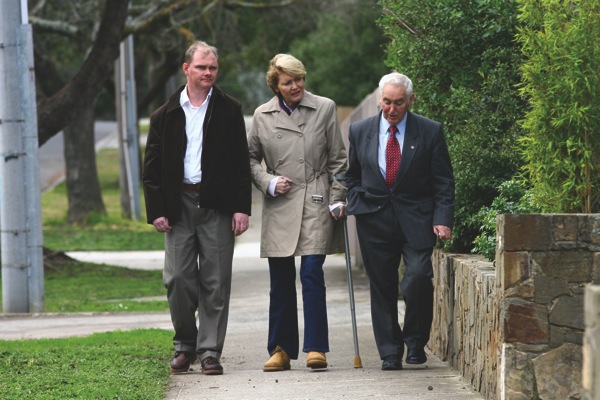Stroke is Australia’s second single greatest killer after coronary heart disease and is a leading cause of disability, costing Australia an estimated $2.14 billion per year. In 2008, Australians will suffer close to 60,000 new and recurrent strokes – that’s one stroke every ten minutes. Stroke kills more women than breast cancer and over the next ten years more than half a million people will suffer a stroke.
“Clearly we have a big job to raise awareness, get governments to act to prevent stroke, provide better treatment and then care for stroke survivors and find ways to prevent stroke,” says The National Stroke Foundation’s Chief Executive Officer, Dr Erin Lalor.
With the majority of its funding coming directly from the community, The National Stroke Foundation advocates and educates while also providing information and support to people who are concerned about family members who have had a stroke or who might be at risk from stroke.
Even with a comparatively small staff and limited budget, The National Stroke Foundation manages a successful public awareness program, fighting through the media jungle and running modest advertising campaigns during National Stroke Week with some support from a few governments and business partners.
“Our news media publicity has drawn on the stories of those who have experienced a stroke either themselves or as family members. Inspired by survivors who have overcome great difficulties following a stroke, and the strength of the support they receive from relatives and carers, we decided to take our message directly to Members of Parliament in Canberra,” says Dr Lalor.
The results of a research project provided an ideal opportunity to reach Parliamentarians and a decision was made to announce the findings at Parliament House in Canberra. The research identified which services and support stroke survivors and their carers needed. Their stories were heart-breaking and were published in a 10,000 word report with recommendations for action.
The report painted a bleak picture for stroke survivors who described how they struggled to regain their health after a stroke. They said they had difficulties finding information to help them recover. Many suffered from social isolation and depression and nearly all feared they would have another stroke.
“Based on surveys and in-depth interviews we found that more than a third of survivors needed help with everyday activities, and nearly all reported they had not made a full recovery. For many carers their over-riding concern was that their spouse or partner would die leaving them distraught and vulnerable.”
Eleven stroke survivors and carers from Victoria, Tasmania, Sydney and Canberra went to Parliament House for the launch of the report, Walk In Our Shoes, by the then Health Minister Tony Abbott. Talking with Parliamentarians and visiting their offices, the delegation asked MPs to ‘walk in our shoes and face some of our difficulties’. They left copies of the report and a DVD of video interviews they had recorded, which had been shown at the launch.
Eight months later, The National Stroke Foundation held a national summit in Melbourne, partially funded by the Federal Government, which developed a stroke support strategy that has now been published.
Dr Lalor says that appearing before House or Senate committees or addressing government or opposition special interest groups is another useful way to raise issues face to face with a group of MPs. While it’s an opportunity to make arguments in support of Budget funding, she says that it is just as important to be able to present research and strategies that are based on evidence gained in the field – important, because this reinforces the credibility of the organisation and can lead to government action.
In the weeks leading up to National Stroke Week 2008 in mid-September, The National Stroke Foundation wrote to every federal and state Member of Parliament offering them the FAST wallet/purse ‘life-saver’ – a card that lists the warning signs of stroke. FAST stands for Facial weakness, Arm weakness, Speech difficulty, Time to act fast. They suggested that the MPs support their FAST campaign by sending the cards to constituents.
The result was positive. Two weeks before Stroke Week began, The National Stroke Foundation was processing requests from more than 140 MPs for some 120,000 FAST cards; offers of assistance and promises of publicity – MPs had been provided with a draft media release that they could send to their local media.
“We were not appealing for dollars. It was not a fund-raising campaign. We were looking for the support of opinion makers and community leaders. And we got more, practical action that will lead to the community having a better understanding of stroke, how to avoid it and what to do if a relative or friend suffers a stroke,” Dr Lalor says.
“This was another step towards the goal of saving 110,000 Australians from death and disability due to stroke over ten years.”












